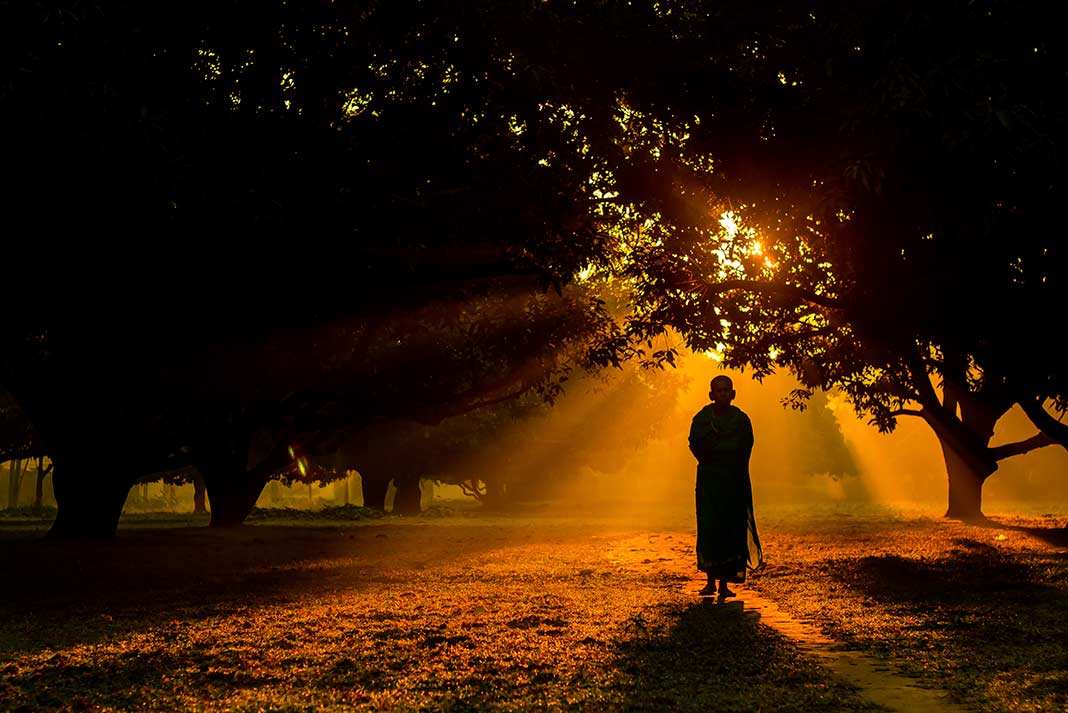
An excerpt from In the Light of the Self: Adi Shankara and the Yoga of Non-dualism
Some villagers, having traveled many miles on pilgrimage to Kashi, had now come to have the darshan of the young sage they heard about as soon as they arrived in the town. Rather shyly, they sat down on the floor in front of the young monk’s couch, and after a few moments their headman opened the discussion with a question: “Maharaj shri, the sacred texts always talk of the necessity of having knowledge, yet many of us are simple people with no schooling. Does this debar us from spiritual progress?”
“Certainly not. The knowledge that is spoken of in the texts has nothing to do with book learning or the specialized education of the pandit. These are but the superficial levels of knowledge. The essential knowing is to know the Self, by which is meant enjoying the direct experience of that inner happiness which remains unshaken no matter what may happen in the outside world. This type of knowing is as direct an experience as the luscious taste of a ripe mango!”
There were smiles in the group and relief softened some of the lined faces.
Then, a change of direction: “Without this knowing there is no end to the cycle of birth and death.”
“How is that, sir?”
“Each one of us must endure the fruits of his past actions. Whatever a human being is involved in during a lifetime leaves its impression stored in his mind and this impression acts as the seed from which future desires and actions will, in time, sprout. These seeds may take many births to come to fruition; like any crop, they need favorable conditions to appear. You are a farmer, sir, so you know well the principles involved here.”
The headman nodded, then asked, “So is this the cause of rebirth, sir?”
“It is. An individual may have to take an indefinite number of births to harvest the effects of all his latent impressions, and then, in each fresh lifetime there is further action, which sows further seeds of karma.”
The questioner looked rather glum. “It sounds a never-ending process.”
The young monk smiled.
“Well, it will continue until the destruction of its cause.”
“And what is that, sir?”
“The way we identify with our body as the doer of action. And this lifelong habit is only destroyed by knowing oneself to be the bodiless Self. This is why it is said that knowledge is the fire that reduces karma to ashes.”
After a few moment’s silence the older man asked, “And does a person whose karma is burned up by the fire of knowledge continue to act in the world?”
“He does, indeed, but his action is free from personal desire and attachment. If he is a householder engaged in the world of work and family, then he continues to act to set an example to the people around, even though he does not feel himself to be acting at all. If, on the other hand, he is one of those who have taken the formal vow of renunciation, then his actions are merely such as are needed to maintain the body. But in either case, he does not feel himself to be acting at all. He has become the great silence that is beyond all activity. Once he knows the truth of action and the truth of silence together, his karma is said to be burnt to ashes. This is the status of a real man of knowledge, and such a man is quite untouched by the poison of doubt, which is a source of ruin for many on the path.”
Another of the villagers, who had been following the discussion keenly, then spoke up, “But if a person’s karma has been destroyed, how does he continue to exist as a body at all?”
“Those actions which brought this present body into existence in this lifetime have already begun to bear fruit, and this must continue until their effects have been fully worked out. The experience of the Self destroys only those seeds of action as have yet not begun to sprout. This applies whether those unsprouted seeds were created in this life prior to the arising of spiritual knowledge, or in any number of previous lives.”
A third visitor, feeling the discussion was becoming too abstract, put his own question, “Maharaj shri, surely devotion to God is also needed to realize the Self?”
“Yes, but if you do not know what God is, how can you be devoted to Him? Real devotion is not a mood you can practice or a state of wishful thinking. It is the direct experience of God. When you see Him as ever present, everywhere and in everything, and you perform service to Him constantly and worship to Him continuously, that is real devotion.”
“How can we bring this state about?”
“Choose one of His many forms and get to know Him intimately. Become familiar with Him in, and as, and through that form. It does not matter which form you choose, be it Narayana, Vasudeva, Hari, Vishnu or Krishna, all are good and you should just follow the one you feel most naturally drawn to. If you are sincere in your devotion, supreme knowledge will surely dawn and then you will always remain absorbed in God and devoted to Him. He who has drunk the nectar of knowledge and realized his unity with God has done all that is to be done. His evolution is completed; he has attained the final goal of human life.”









